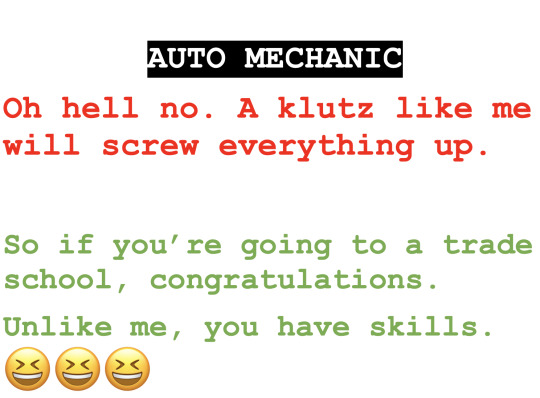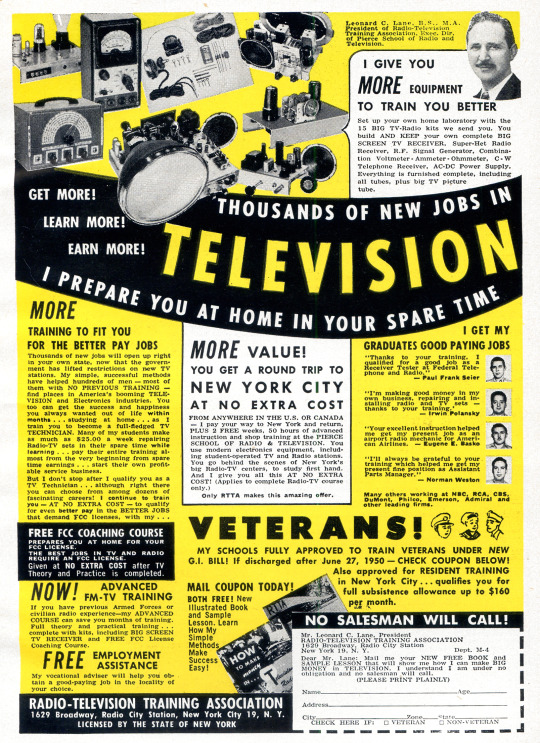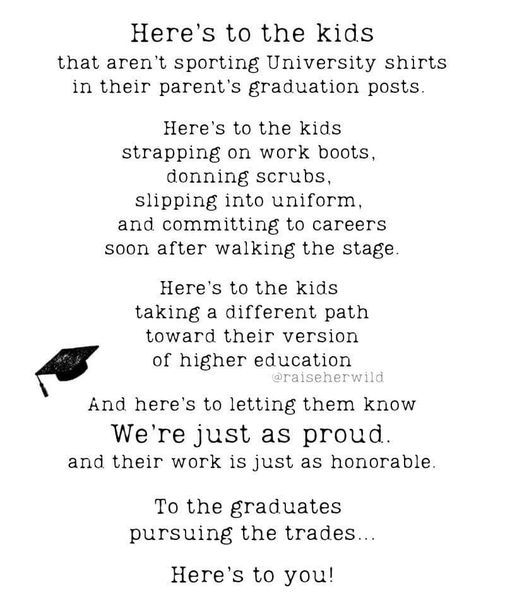#Trade School
Explore tagged Tumblr posts
Text
A thing that bothers me about wizard schools in popular media – outside of the magic-grade-school stuff, anyway – is that they're typically depicted as being basically magic universities, but their actual curricula and pedagogical approaches look much more like those of a technical institution. Like, buddy, that's not a wizard university, that's a wizard trade school. You can't just slap university student culture on top of trade school pedagogy. It doesn't work like that – the one emerges from the other!
62K notes
·
View notes
Text


Being the only plumber in the Darklands can be too much. Time to train the next generation of koopa plumbers at Luigi’s Plumbing School.
#luigi#koopas#koopa#plumbing#plumber#trade school#implied bowuigi#bowuigi#luigi x bowser#luigi super mario#super mario brothers#super mario bros#super mario#a little bit of art while I deal with writer’s block#a little expansion in the lore of my au#the blossoming of luigi
90 notes
·
View notes
Note
Sliiightly unrelated, and I absolutely don’t mean this condescendingly (and I don’t mean to keep bothering you either, feel free to ignore ofc) — I’m just in the dark. When you say ‘Trade work’ and ‘learn a trade’… what do you mean by a trade? The only thing that comes to mind with ‘trade’ is being a plumber, woodworker, etc but I’m pretty sure that’s not what you meant ahejdydj
It is! Due to the push for young people to go to college and get jobs that utilize those degrees, the United States has actually seen a concerning decrease across the decades of people who are qualified to do trade work such as plumbers and electricians, etc. As a result, the population in those trades is aging quickly, and we are anticipating that there won't be enough people to do those jobs very soon. A lot of them are nearing retirement age. Thanks to that demographic shift, young people entering those trades are a very high demand, and in many areas, the pay for such a job can be like 50,000 a year, which can be a solid living wage on par with something like teaching. And in most cases, the apprenticeships are paid, which is definitely a consideration for people who don't want to deal with student loans.
@thisarenotarealblog, any input?
#trade services#trade work#plumbing#electricians#vocational work#trade school#united states#economics#Anonymous#phoenix answers asks
59 notes
·
View notes
Text


Source
34 notes
·
View notes
Text


#trade school#school#student#student life#creative writing#writing#writing life#writers on tumblr#writing community#writerscommunity#writers#writeblr#writer#funny jokes#funny#funny stuff#funny post#humor#jokes#lol#funny humor#humorous#hilarious#haha#just for laughs#just for fun
21 notes
·
View notes
Text
Vo-Tech school
Ok, so the fact the older highschool students can attend a tech school to learn trades instead of doing their last two years of hs is great; the fact that they cover electric, HVAC, auto, carpentry, cosmetology, and more, is awesome. The fact that my daughter had a great senior year and faced virtually no harassment or difficulty for being a girl in electrical is wonderful. But the payoff.
The payoff, for me. Is sitting an a chilly, boring auto dealership waiting room, waiting for a routine service appointment, with my dear daughter. A waiting room that is graced by a flatscreen playing endless (aggravating) HGTV home-reno shows. As I am trying to focus on my book, my cute, sweet, teenage daughter erupts, snarling, "WHY the #$%&#$^% did he DO THAT - he didn't shut the electric off at the breaker box before he started? Why would? Doesn't he? AAAAUGH!"
I'm. dying. the sheer entertainment value. Of seeing a Childe get so wroth over (a very legitimate) electrical issue. Aaaaaaah!
16 notes
·
View notes
Text
Guess who got accepted into college...
ME! RAAAAAAAAAAAAAAAHHHHH! 💯💯🦅🦅🦅🦅🦅🦅🦅🔥🔥🔥🔥🔥🗣️🗣️🗣️🗣️🗣️
7 notes
·
View notes
Text
women/dykes/gnc ppl in the trades: what has ur experience been like? I’m considering going to trade school but I’m slightly apprehensive. I’ve worked in kitchens on and off for the past 6 years and how male-dominated it is can get me pretty down so I’m wondering how the trades compare
#irinachernenko.txt#dyke#queer#trade school#working class#lesbian#gnc#butch#i also don’t know what kind of trade to pick up#I’m afraid I don’t have the math skills for a lot of them#pls advise#butch lesbian#gnc lesbian#gnc women#queer community#lgbtq#lgbtqia#lgbtq community
17 notes
·
View notes
Text

Graduation (?), Harlem trade school, 1927.
Photo: James van der Zee via the Howard Greenberg Gallery
#vintage New York#1920s#James van der Zee#Harlem#vintage Harlem#trade school#old New York#old Harlem
101 notes
·
View notes
Text

Today's message of the day is about how you're taking your education so seriously that you're beginning to resent it.
This could be any type of education; spirituality, college/trade school, etc.
If this sounds like you, keep reading.
Education is very serious, and depending on the type, paying close attention might be important because making mistakes could have terrible ramifications.
However, serious doesn't have to mean boring or a chore. There are ways to make any kind of learning fun if you try.
No matter how serious the subject of education is, you aren't going to learn anything or commit it to memory if you're studying begrudgingly.
It might be a good idea for you to Google fun/entertaining study tips. Maybe try studying with a friend.
Or, it could be the field of study you've chosen is simply not for you. lf you hate it already, how can you imagine committing a large portion of your life to this subject matter?
Maybe there's a different subspecialty you could pick up. Or maybe the whole thing isn't for you.
The important thing is that you enjoy what you're spending a lot of your time on. You don't deserve a miserable life.
Changing your mind isn't quitting. lt's doing what's best for yourself. You must be strong enough to make whatever change is necessary to make yourself happy.
#tarot#oracle#oracle cards#witchblr#college#spirituality#trade school#learning#witchythings#spiritual journey#spiritualgrowth#spiritual awakening
4 notes
·
View notes
Text
I answered one of these the other day, but some options were missing and it didn't feel inclusive enough towards non-US people and people who didn't do university studies so...
"Still studying" = I am pursuing studies in a school (of any kind) at the moment or have enrolled to start soon.
And because these things are Complicated worldwide, please consider:
* high school: a school where you get a general education in a variety of subjects until approx. age 18; graduating from a school like allows you to enroll at university. This includes diplomas such as GCE A-Levels, baccalaureat, Abitur, Matura, etc.
** trade / vocational / technical school: may be an alternative to high school or something done after high school instead of university to learn a trade/craft; when you graduate, you are qualified for a job in the field you studied. Universities may not let you enroll or may ask you to do preparatory classes if you have this type of diploma.
*** Bachelor's degree: a degree equivalent to 3-4 years of university studies. If your diploma is not called a Bachelor but you studied for that long at a university or equivalent institution, choose this.
**** Master's degree: a ~2-3 year degree that complements a Bachelor's degree. If your diploma is not called a Master but you studied for 5+ years total at university or equivalent institution, or got extra uni-level qualifications after your first university degree (but not a PhD/MD), choose this.
24 notes
·
View notes
Text

Television? It'll never catch on, just another one of those nerdy technogizmos you hear about.
Popular Mechanics April 1953
#vintage ad#vintage ads#advertisment#advertising#television#trade school#education#electronics#1953#1950s#1950s ad#1950's#1950's ad#funny#humor#humour
23 notes
·
View notes
Text

I've got two degrees from Purdue University (BA in Education and an MBA from the Krannert School of Management, now renamed for our beloved former school President and Indiana Governor Mitch Daniels), but when anyone asks me for career advice, I always tell them to go to a trade school and learn auto repair, HVAC repair/installation, plumbing, electrical, etc. Those skills are fading fast since government schools stopped teaching. Kids that learn a valuable, marketable skill will almost always start their work-life with less debt, and will end up making more money than the typical college grad of the 2020's and up.
10 notes
·
View notes
Text
Trade school got me feeling like

Get paid to learn is comp (finna drop out this semester)
2 notes
·
View notes
Text

Hvac/r technician in training p.2
#the carabiners is on my left the photos just reversed it#my femme thought that was funny#butch#butch in trades#trade school#hvac technician
18 notes
·
View notes